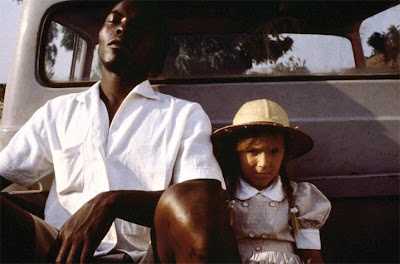White Material - Claire Denis

By Moira Sullivan In Claire Denis White Material set in an unknown period in an unknown country we could believe that it is Cameroun in the midst of winning its independence with a long war that dragged out for 10 more years of civil strife. Rebel soldiers roam the lands of the French and steal their possessions. The French are leaving, and those remaining are unprotected. Marie Duval (Isabelle Hubert) insists on staying. She is oblivious to the dangers, and puts her family and her workers and servants at risk for refusing to leave. A local DJ gives news to the rebels in veiled language, and everywhere in the film , a transistor radio updates the ongoing strife. In general, the news of everything from marriage, to weather conditions is transmitted by radio. White Material is told in a smooth fragmented narrative style . Its chronology is inverted with the present at the apex of the film and frequent flashbacks to the days when the colonial presence was intact ...

